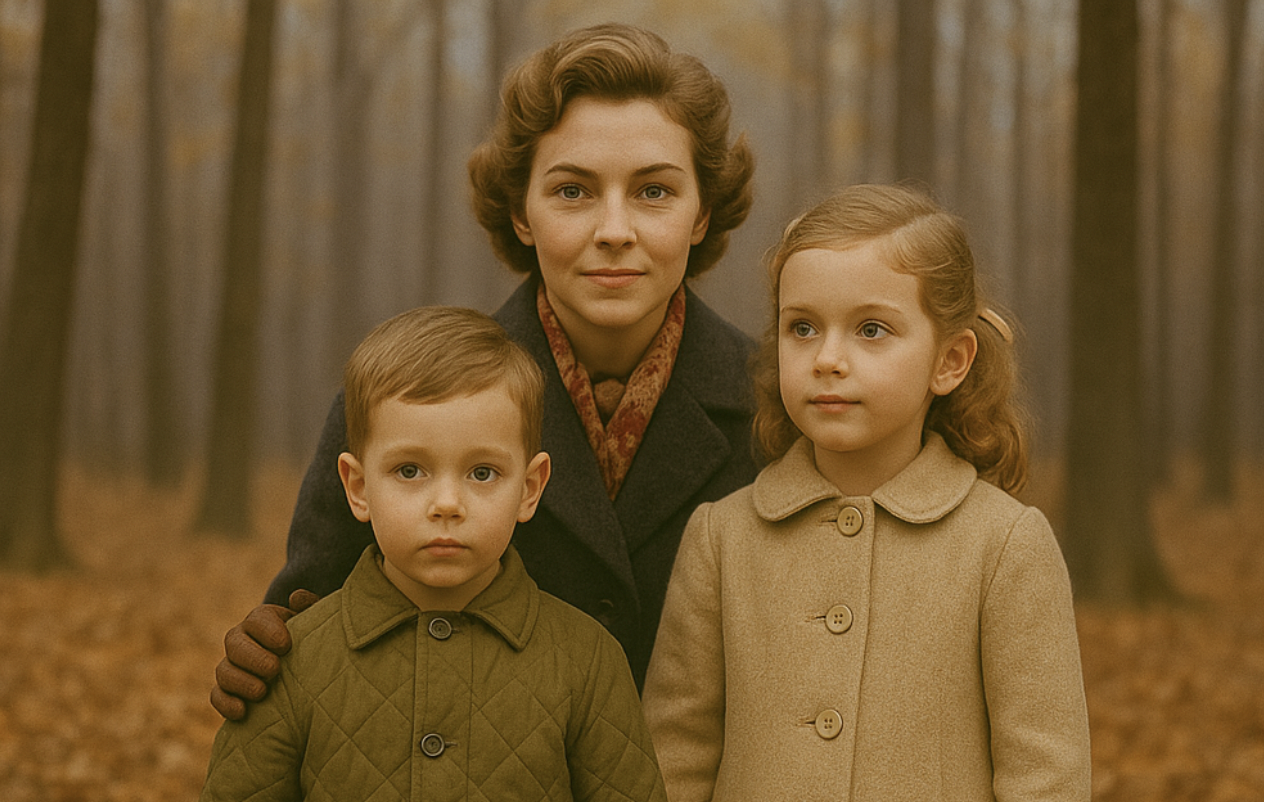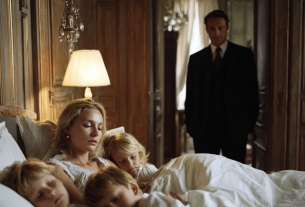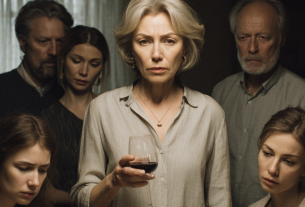A soft child’s cry shattered the forest’s midday hush. Anya froze, listening intently, her heart beating faster.
“Probably just my imagination,” she whispered to herself—then heard it again, clearer this time.
The herb basket in her hands grew heavier; it was already half-filled with mint and St. John’s wort. The woods simmered in summer heat, the air thick with warm pine and wild-strawberry scents. Parting the tall stalks, Anya took a few steps toward the sound.
“Hello—who’s there?” Her voice quavered.
The crying grew louder. She hurried on, stumbling over roots. Thorny branches snagged her pale dress; her braid came loose—but none of that mattered now.
The trees opened onto a sunlit glade. By an old oak, half hidden among giant burdock leaves, sat two children.
A boy—pale, sweat-dark hair plastered to his brow—was clutching a younger girl, a red-haired thing in a filthy frock.
“Dear God,” Anya breathed, letting the basket fall.
At the sound of footsteps, the boy jerked up his head. Fear filled his eyes. He pulled the girl closer and edged back.
“Don’t be afraid.” Anya knelt, moving slowly. “I won’t hurt you.”
The girl whimpered, burying her face in her brother’s shoulder. Her small hands trembled.
“How did you get here? Where are your parents?” Anya asked gently.
The boy kept silent, gaze wary. His clothes were torn, a smear of dried dirt flaking on his cheek.
“My name’s Anya. What’s yours?”
He licked dry lips. “Sasha,” he whispered.
“And your sister?”
“Masha.”
Anya looked around—no sign of any adults. Only the drone of insects and a throng of ants hurrying toward a giant mound.
“Are you hungry?” she asked, realizing the children had been out here a long time.
Sasha nodded uncertainly.
“Would you like to go home?”
“We don’t have a home,” he said, barely audible.
Something twisted painfully inside her. Anya bit her lip to keep from crying.
She was only twenty herself, and an empty house was all that waited for her: Father had died a year ago—gone in a week to a strange illness—Mother soon after, her grief too heavy to bear.
“I know a house where you can eat and sleep. Will you come with me?”
For the first time Masha lifted her head. Hope flickered in her green eyes.
“Is it scary there?” Sasha asked.
“Not scary at all.” Anya smiled. “There’s an apple orchard, fresh milk, and no one will hurt you.”
She held out her hand. After a short hesitation the boy took it; his palm was small and fever-warm.
The walk back took twice as long. Anya carried Masha—light as thistledown—while Sasha clung to her skirt, stumbling from exhaustion yet refusing to ask for help.
By the time their village appeared in the distance, the sun was sinking. In the lane they met Ivan Timofeyevich, the dour-faced neighbor with kind eyes.
“What’s this you’ve got?” he exclaimed at the sight of the children.
“Found them in the woods,” Anya replied. “Hungry, scared.”
He scratched his stubbled chin. “And their parents?”
“Don’t know. They say they have no home.”
The old man studied the silent little pair. “Just like your father, girl. His spirit lives in you.”
“What should I do, Uncle Vanya?” she asked, flustered.
“First feed them and wash them. We’ll figure out the rest.”
He offered Sasha a gnarled hand. “Well, hero, can you make it, or shall I carry you?”
After a pause, Sasha laid his hand in his.
The house greeted them with dimness and neglect. Anya lit a lamp and sat the children at the table. All she had till payday was a heel of bread and a bit of milk.
“Eat,” she said, slicing the bread thin.
They ate slowly, as though the food might be snatched away. Masha kept glancing around; Sasha’s eyes tracked Anya’s every move.
“Tomorrow I’ll bake pancakes,” she promised, stroking the girl’s tangled hair.
After supper Anya heated water and bathed them in the old wooden tub. Lacking children’s clothes, she wrapped them in her own T-shirts.
Sasha’s white shirt hung to his knees, comical; Masha disappeared inside a soft nightgown. Anya tucked them into her bed, then sat beside them as dusk fell and crickets chirred through the open window.
“Will we always live here now?” Sasha asked drowsily.
“If you want to,” she murmured, smoothing his hair.
“No one will drive us away?”
“No one. This is your home now.”
Masha was already curled up, asleep. Sasha fought slumber, but his eyelids drooped. “Sleep, my brave one,” Anya whispered. “I’m right here.”
When they drifted off, she slipped to the porch and finally let herself sob—out of fear, out of uncertainty, out of the sudden weight on her shoulders.
Yet deep inside glowed a strange new joy.
“Where are the children’s papers?” The woman in a severe suit peered over her glasses, lips pursed.
Two weeks had passed since Anya brought the little ones home—two weeks of toil, sleepless nights, unexpected happiness.
“I’ve told you,” Anya clasped her hands. “I found them in the forest. They had no documents.”
The child-welfare officer tapped her pen on the desk. “Without guardianship papers we must place them in an orphanage.”
Anya’s head swam. Sasha, standing close, gripped her skirt tighter.
“They have no one. Only me.”
“The law is the law,” the woman cut her off. “Pack their things—we’ll come tomorrow.”
They stepped into the blazing street. Masha slept in Anya’s arms, lulled by the heat. Sasha trudged beside her, tense beyond his four years.
“Will they take us away?” he asked as they neared home.
“No,” Anya said firmly, though she had no idea how to keep her promise.
That evening Ivan Timofeyevich appeared with milk and fresh bread.
“Not eating again?” he grumbled at Anya’s drawn face.
“Uncle Vanya, they want to take the kids,” her voice shook.
The old man frowned, arms folded. “Bloody bureaucrats. Your father didn’t save my life for me to abandon his daughter.”
He pulled a battered notebook from his pocket. “I know someone in the district office. We’ll go tomorrow.”
Anya didn’t sleep that night. The children breathed in unison; Masha whimpered now and then, and Sasha, still dreaming, hugged her closer.
In the morning they set off. The old Moskvich rattled toward the district center, children nestled on the back seat.
Dust and bustle greeted them. The guardianship chief’s office was on the third floor of a shabby building.
Ivan whispered something to the secretary; they were ushered in ahead of the line.
“Pavel Semyonovich!” the old man boomed. “Long time no see!”
The burly official broke into a grin, embracing his visitor.
The children remained in the corridor with the kindly secretary. Half an hour later Ivan emerged, beaming.
“Temporary custody will be signed right now. Adoption can come later.”
When they got home, the village officer was already waiting by the gate.
“We’ve been looking for you everywhere,” she said sharply.
Ivan handed her the papers. “Order from the district authority. The kids stay.”
Anya led Sasha and Masha inside, leaving him to the paperwork.
“We’re not going anywhere?” Sasha searched her eyes.
“No, you’re not,” she smiled, hugging them both.
Life found a rhythm. Anya took a full-time job at the village library, where the children could stay with her.
Sasha soon tackled syllables, proudly tracing lines while teaching his sister. Masha adjusted more slowly; nightmares often woke her screaming, and Anya would rock her, singing the lullabies her mother once sang.
One night Masha woke crying. Anya carried her onto the porch under a sky ablaze with stars.
“Mama,” the girl whispered, touching her cheek. “You’re my mama, aren’t you?”
Anya’s breath caught. “Yes—if you want me to be.”
Masha nodded and snuggled closer, drifting back to sleep.
Years passed.
School proved another test for Sasha. Everyone knew the story of the foundlings, and children can be cruel. When he came home with a split lip, Anya didn’t scold—she just held him.
“They say I’m homeless,” he sobbed. “That even my real mother didn’t want me.”
“You’re not homeless,” Anya said firmly. “You have a home and a family.”
“But you’re not my real mom.”
“A real mother is the one who loves you, not just the one who gave birth,” she answered, recalling her grandmother’s words.
That day Sasha studied the photos of Anya’s parents on the wall.
“Do you think your mom and dad would have accepted us?”
“They would have loved you,” she said with certainty. “Just like I do.”
The children were thoroughly at home now: Masha washed dishes, Sasha hauled water and swept the yard. Evenings found them by the stove, listening to Anya read.
That spring the library door creaked open, letting in an April breeze and a stranger.
A tall man with tousled dark hair and glasses slipping down his nose. Anya looked up from catalog cards.
New faces were rare in the village—especially ones with a thoughtful gaze and a hint of a smile.
“Sorry to intrude,” he said, laying a worn briefcase on the desk. “I was told you’re the keeper of local lore. I’m the new literature teacher—Alexey Sokolov.”
“Anna Serova,” she introduced herself, feeling an unfamiliar flutter. “How can I help?”
“I’m preparing materials on regional history for class,” he explained, scanning the shelves. “I want the pupils to know their roots.”
Their conversation was interrupted by a cheerful shout:
“Mom, look what we drew!”
Sasha and Masha bounded over, waving their sketches. Alexey eyed them kindly.
“They’re yours?” he asked, smiling.
“They’re mine,” Anya answered simply.
Alexey became a regular visitor—sometimes for books, sometimes to chat. Soon he was stopping by the house to chop wood or mend a fence.
“He fancies you,” Ivan Timofeyevich remarked one day, watching the teacher hammer a loose board. “Haven’t seen such a decent man in ages.”
Anya blushed. “This isn’t the time. The children—”
“Children need a father,” the old man winked. “Especially Sasha. A boy needs a male example.”
Indeed, Sasha blossomed around Alexey, helping with chores and peppering him with questions about school.
One evening Alexey stayed late. They sat on the porch, sipping herb tea as crickets sang and jasmine scented the night.
“The moments that change us forever are rare,” he said quietly, eyes on the moonlit path between the apple trees. “When I saw how you are with the children… Strength and tenderness—both at once.”
“It’s nothing special,” Anya shook her head. “Anyone would’ve done the same.”
“Not true,” he insisted. “Most wouldn’t. I’ve wondered what I would’ve done in your place.”
“And?”
“I hope the same—but I doubt I’d manage alone. Yet you do.”
“I’m not alone,” she smiled. “Uncle Vanya helps. The whole village, in their way.”
“And I do,” he added softly, covering her hand with his.
They married that winter, celebrating with the whole village—simple, heartfelt.
Alexey moved in on the last day of January, snow swirling outside. Sled tracks marked the pristine drifts where his few possessions lay: a battered suitcase of books, a guitar in a cracked case, and a cherished Melodya turntable with a stack of records.
Sasha trailed him, eager to shelve the books—physics and astronomy texts, Yesenin’s verse.
“You know,” the boy said, running a finger along a spine, choosing his words, “something was always missing before. Now it’s like the last piece clicked into place.”
“You had everything already,” Alexey smiled. “I’ve only joined your family.”
That spring Anya learned she was expecting. The children rejoiced—Masha stroked the rounding belly; Sasha threw himself into his studies “to set an example for the baby.”
Summer came. The orchard bent beneath ripening apples, heat shimmered in the air. From the new veranda, Anya watched Alexey teach Sasha to fly a kite.
“And what are we now?” Masha asked, settling beside her.
“What do you mean, sweetheart?”
“He’ll be our little brother,”—she touched Anya’s stomach—“but who are Sasha and I?”
Anya hugged her. “You’re my children. I didn’t give birth to you—I found you. My greatest treasure.”
“In the forest,” Masha giggled. “Tell me again how you found us.”
And so Anya told—for the hundredth time—the story of the summer day, the crying in the woods, the fear and the resolve, the two frightened toddlers beneath the old oak.
“And I took you home,” she finished with the familiar words, “forever.”
Evening settled in. Fresh-cut hay scented the air; laughter drifted from the river where children splashed.
High above, the kite Alexey and Sasha launched soared proudly over the village.
Anya rested a hand on her stomach, feeling gentle kicks.
A life that began with a child’s cry in the forest had become something far greater—a true family, pieced together with love and care. Blood alone hadn’t bound them—something stronger had.


